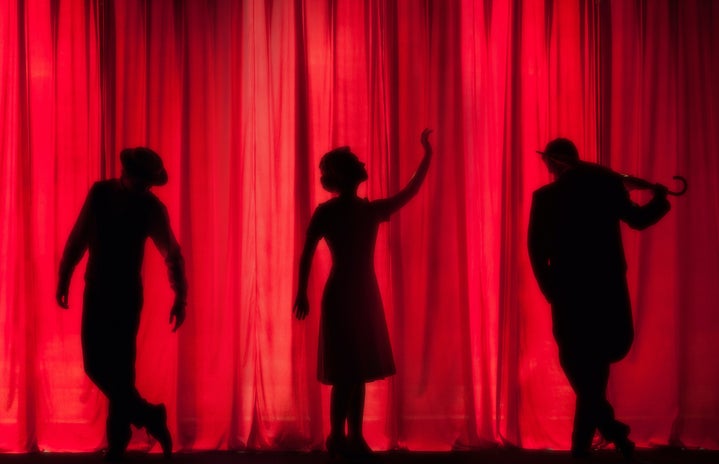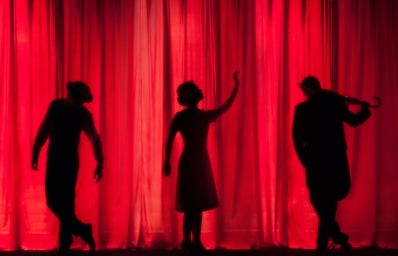When viewing artistic media, such as theater, each viewer holds a certain expectation when entering the space. At times, that expectation may be completely splintered, exploding shards that will remain embedded in the memories of those who saw it. The University of Washington (UW) School of Drama’s rendition of the Caucasian Chalk Circle was one such play. It told the story of a governor’s child abandoned in the disarray of a coup, who is cared for by a peasant girl, and whose custody is later disputed. The story took place within the context of a community meeting discussing the means of ownership of land, varnishing the play with ample attention to the themes of justice and morality. Though taking place in what seemed like a small, bordering-on-cramped theater, the captivating performance that entailed lent a gravitational pull and emotionally compelling push and sway that could not be contained.
Beyond the intricacies of the storyline itself, which can be easily found elsewhere, the execution and creative liberties taken by the production team and cast were phenomenal. The symbolism added to the meaning behind the story in an overwhelmingly profound way, such as with the American flag being waved during the uprising, signaling a possibly toxic obsession with freedom, or with the creative costuming that was plastered throughout the play. The exemplar was the use of bubble wrap as the capes of the governor and the governor’s wife, seemingly gesturing to their fragility and ultimate downfall, while also juxtaposing the regal gravitas of their characters. Details like these demonstrated a masterful use of symbolism for social commentary that continued in other ways that made the storyline more complete.
Importantly, the use of the crumpled-up “community” banner as the child held meaning with how different characters interacted with it. Grusha, the peasant girl who had taken the child in, seemed to be the only one truly invested in caring for it—the idea of community—while other characters, like the governor’s wife, deserted it easily, potentially motioning to another subtle critique of values across class divides. This also points to how the claim to community is for those who foster it, demonstrated by how Grusha was proclaimed to be the true mother rather than the governor’s wife, the birth mother. In this way, community can transcend blood links. Evidently, the methods of the production team and cast seemed to fill every scene with details so wholly that it was a shame to blink.
Truly, with the shared mediums that the production team utilized, each piece was integral and mesmerizing on its own, but combined, constructed an enchanting ambiance exponentially greater than the sum of its parts. Whether through the puppetry on the projector, blurring lines between musician and stage, lighting, use of costumes and props, or the dominating presence of the cast themselves, the play proved riveting in every way. The ability of the other members of the cast to portray different roles so intently was also remarkable, and each member of the team played their part beautifully. The main singer, Yeonshin Kim, also acting as the narrator, stood out notably. Her design seemed to depict her as a dark angel, weeping the characters’ sorrows, with black tassels for wings, and her soulful intonations matched the role perfectly.
If drama is intended to compel, then UW School of Drama’s telling of the Caucasian Chalk Circle certainly achieved that for me, completely deconstructing my expectations and lodging its way into my memories. Compared to the plays I attended in high school, it was on a completely different level, beyond just a step up, but journeys away. The intense moments with high tension flooding the theater and immersive accenting music or the raw, powerful vocals left me on the verge of tears with how breathtaking it was, and the message conveyed made it even more impactful. Ownership is tied to those who make the effort to care for and nurture the subject in question; it takes heart, and the production team and cast certainly claimed the play as their own with all the skill and effort demonstrated.
Moreover, the theme of ownership stemming from devotion stands stiffly and resoundingly, especially today, where the topic may arise, whether through similar situations regarding custody or right to land, or in other increasingly prevalent situations, such as creative ownership with the addition of Artificial Intelligence within our already digitized spaces. It is a message made more potent from its artistic telling, and points to the strength of drama in informing hearts. After all, it is a craft owned by those who have devoted their own hearts to it, and it shows with chalk and awe.
- For UW students, the event listing can be found at https://drama.washington.edu/events!


